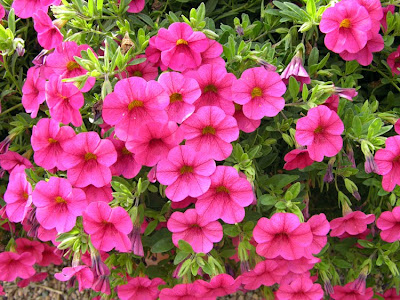 Those who love plants have surely been to their favorite garden center this spring and noticed calibrachoa, the great warm-season performer with small flowers that look like petunias.
Those who love plants have surely been to their favorite garden center this spring and noticed calibrachoa, the great warm-season performer with small flowers that look like petunias.Calibrachoa (pronounced kal-ih-bruh-KO-uh) is more commonly called million bells. These plants are related to petunias and should be grown in full sun. They produce an unbelievable number of inch-wide flowers from spring until frost.
The plants grow up to 10 inches tall and have trailing stems that will spread to create a beautiful ground-cover mat or sprawl over the edge of containers or hanging baskets. If the plant gets a little out of hand, prune it to generate more growth and more importantly more flowers. It will tolerate part shade, but flower production will decrease according to the level of shade.
There are many series of million bells available in shades of blue, violet, purple, magenta, red, orange, bronze, yellow and white. Though it puts on a show of literally hundreds of flowers, deadheading is not required, as the plants are self-cleaning.
Million bells, like petunias, are vigorous, tolerate heat and have few insect pests. Unlike petunias, the leaves of million bells are not sticky. It also tolerates drought better and has a more bushy and compact growth habit than petunias. Million bells are suitable for both the landscape and containers. Either way, the effect is incredible. They are easy to care for in hanging baskets, containers, landscape borders or accent ground covers in small areas.
This plant may actually thrive on a little neglect. Water only when the top of the soil feels dry. Too much water can lead to root rot problems, especially when planted in the landscape. Million bells is a tender perennial that may overwinter on the Coast, but it should be used strictly as an annual in the north.
If planting in the landscape, amend the soil using 3 inches of organic matter to improve drainage. Finish the planting with a good bark mulch to keep the soil cool, help slow evaporation and retain moisture. Million bells do not need much fertilization, but when growing in containers or hanging baskets, feed every other week with a 20-10-20 or 20-20-20 water-soluble fertilizer.